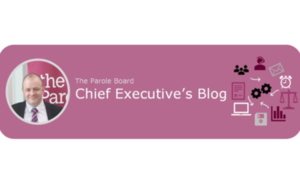Parole Board Chief Executive's blog - June 2019
In his latest blog, Martin Jones, CEO, talks about outcomes from the first stage of the member recruitment campaign, a delegation looking to introduce parole in the Czech Republic, and a visit to HMP Rye Hill.

Parole Board CEO
Recruitment update
I have spoken at length about the lack of diversity amongst Parole Board members and the urgent need to change this, so that the Board better reflects the community.
To start to address this issue, we wanted to approach our most recent recruitment campaign differently.
The campaign focused on three regions in the North of England, rather than the whole of England & Wales. This is the first time we have recruited in specific regions and it really helped us share the campaign in a more targeted and thoughtful way, working with local charities and media outlets to reach as many potential applicants as possible.
However, words and aspirations are not enough – results are what the Board is going to be measured by. Therefore, I am glad to say that the signs are promising after the first stage of the recruitment campaign.
We had unprecedented interest following our campaign, with 590 people applying to be an independent member. Of these applicants, 27% identified themselves as being from Black, Asian or Minority Ethnic backgrounds.
There was an even higher proportion of candidates from BAME backgrounds who passed the sift of applications, making up 45% of the 130 candidates invited to interview. I think these numbers are very encouraging, both in terms of the overall number of people applying and the diversity of the applicants.
I wish every candidate the best of luck and I am excited to work with our cohort of new independent members once they have been announced.
Czech delegation visit
We had the pleasure of meeting a delegation of policy makers, probation workers and judges from the Czech Republic. They have been running a project to introduce parole in the Czech Republic for the past 10 years and wanted to learn more about how parole works in England & Wales.
Their project ‘Fragile Chance’ has clear parallels to our system – panels of people making decisions on the potential risk of releasing someone, assessing if there have been signs of positive change during their prison sentence. However, there are also some stark differences, not least that people have to request to be considered for parole, rather than it being an automatic right.
The delegation wanted to learn how Parole Board members make risk assessments and so we arranged for them to observe a hearing from our offices via a video-link to a prison. This was the best way to demonstrate how parole works in practice.
We also invited senior leaders and professional practitioners from probation and the Public Protection Casework Section to speak to the delegation about their roles in the parole system. This really demonstrated that for parole to work, agencies throughout the justice system must work together.
Visits like these give us opportunity to learn from others but also to reflect on how we are doing things. What is clear from the discussions we had with our Czech colleagues is that the Board has done a lot of positive work over the past year and is continuing to improve parole by working with others in the justice system.
Visiting Rye Hill Prison
During May I also had the pleasure of visiting HMP Rye Hill.
The day was a real success. I was really impressed with all the residents and staff that I had the pleasure of meeting, all of whom communicated and engaged both confidently and articulately.
I hope that my visit went some way to demonstrate that the independent Parole Board is committed to reviewing each case on its merits and ensure that people who no longer represent a significant risk to the public are progressed or released.
I would like to sincerely thank all of the staff and residents at Rye Hill for the insightful and impressive day that I had.